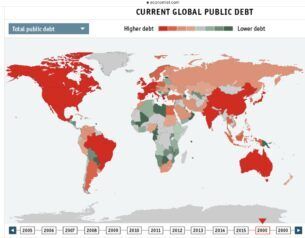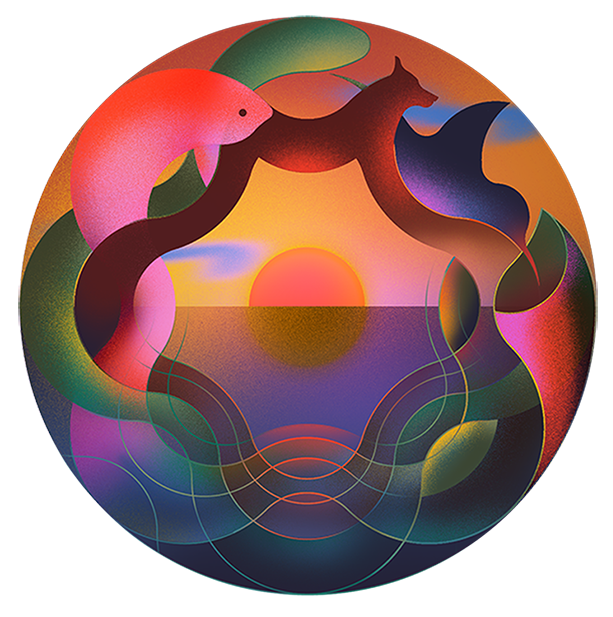Principle of
RETURN
” Don’t it always seem to go that you don’t know what you’ve got till it’s gone.”
– Joni Mitchell
READ and LISTEN along the Principle of RETURN
” Nothing should come at a debt. For a system to grow and accrue wealth, it must create value, not loss; this is a prerequisite for growth and ultimately, regeneration.”
It may seem obvious that if we take more than we create we fall into debt. In times of surplus however, that may not seem so obvious. Much like going on a spending spree with a debit card while our bank account is healthy it can seem – for a while – that the party can last forever.
The rise of globalism has meant that the hidden cost of our wild and wicked ways is often kept out of sight. The bank account in this metaphor is the ravaging of ecosystems in countries far away – not to mention the toll of human and animal misery involved as well.
Hey, big spender!
For every up there is down however. The post-purchase dip that inevitably follows the thrill of the chase has a name: morphic dissonance. This is well known to sellers of big-ticket items so they endeavour to let you down easy by follow up contacts, small gifts or incentives and encouragements to assure you that you have done the right thing with the money you have just parted with.
Unlike morphic resonance, which demonstrates connection, morphic dissonance creates separation and isolation. It is a kind of grief process for the lost high. So while we can buy a thrill, we just can’t sustain it. It is only a matter of time before the negative spiral of addiction pulls us back in and we do it again.
The debt-driven road of no return
That is the problem with our addictions. Sooner or later, we will find ourselves in debt. One of the central problems with our society and our current economic model in particular, is that it is really based upon debt. The so called ‘returns’ on investments in this leaky, linear model are really based on economic and resource losses for someone and somewhere else.
Economic figures are somewhat abstract however. Far closer to home is the ecocide happening to the planet. The race for infinite economic growth in a finitely resourced world means that these addicted, aggressive drivers are running out of road. Even worse, they are driving everyone else off a cliff. (for more onthe 3-part series, The Myth of Growth, click here, here and here ).
The primary system failure is that this model returns very little back into the system from which it takes so much. This is the poverty mentality of the thief, the confidence trickster and the pirate.
It is never enough. Nothing is given back.
Return to sender
It is at this point that we need to grab the wheel and change direction. Which brings us to the next part of the Principle of Return:
” All matter and energy is borrowed.
TAKING vs RECEIVING – it is our right as a member of the natural universe to receive from the abundance of nature. Taking what is not given creates a debt that affects the whole system.”
Nature is, well, naturally abundant because it knows how to balance the books. It knows that if it does not constantly return and reinvest energy back into the system right down to the lowest levels, it will dissipate into entropy.
Our current Pyramid scheme of an economic model only gives significant reward to the smallest part of the pyramid. In nature, it most resembles a volcano with the deep resources of the earth constantly dissipating as heat out the top.
Adam and Eve and the right to receive
Of course, like the biblical tale of Adam and Eve this woeful state of affairs only happens when we take what is not given. The abundance of the garden of nature was theirs to enjoy – just like it is for us. We, as part of nature ourselves, have a right to participate and benefit from its abundance. We also have a responsibility to give back because we know that all that we receive is really borrowed.
When we understand that who we are stealing from is ourselves, we can relax our poverty mindset, stop taking and start receiving and returning.
It took a long time for us to realize we would not just sail over the edge of a flat earth[i]– that it was really a sphere returning upon itself. It is taking us a long time too to realize that unless we return what we borrow we cannot sustain life.
Returning to the body
Zooming this perspective down to the microcosmic level of the body and health, how does this all apply to us as individuals? We also have deep resources that need to be managed wisely. In traditional Chinese medicine, this comes under the control of the Water element. (for a more detailed view of the Water element click here )
The Water element rules over the deep reserves of the body: the bones, the bone marrow (and indirectly, the blood) and the central nervous system, as well as the reproductive system. It shows itself in the lustre of our hair and the gleam in our eyes. In some ways it can be seen as the battery pack of the body.
Like all shiny, new batteries we are freshly charged in our youth. We have a spring in our step, a curiosity and lust for life and an ability to quickly recover from illness and injury as our energy returns quickly. Depending upon how we manage this energy throughout our life will determine its quality and possibly even its length.
The primary reason old age is linked with reduced capacity and disease is simply because we have had longer to accumulate the harvest of our poor health habits. Our “Live fast and die young” culture – you may remember from part one of this series that culture is not really your friend – mirrors the way we have treated our planet at the macro level: “Take everything now. Don’t worry about tomorrow.”
The Water element is not just a one-way street of a battery running out however. By returning energy to it via the Earth element (controlling our intake of food and drink); proper rest; low stress levels due to prioritizing a life of meaning and purpose rather than a fool’s gold of economic ‘security’; a connection to something greater than ourselves that, in turn, connects us with others. Our connection to others, in return, makes both us and them stronger.





